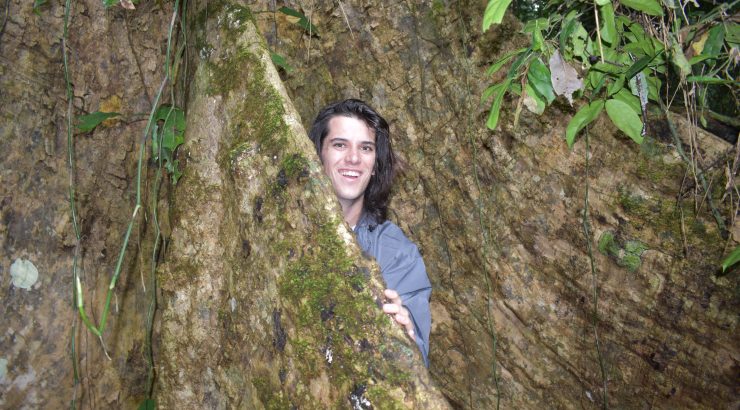Peer Chats: Becoming a sight-thinker
May 12, 2021
Anderson Hill ‘21 is a Peer Advisor in the Center for Global Education. He is earning his undergraduate degree in Business Administration and sailed on Semester at Sea in Fall 2019.
One of the first things we were told as students on Semester at Sea was “just because you’re studying abroad doesn’t mean you’re a tourist. Instead of sight-seeing, try sight-thinking”.
 Yeah, right, I thought. As an American student studying abroad on a cruise ship, how could I not feel like a tourist? Plus, if we were only spending a week in each location, how would I ever find the time to even scratch the surface of the country’s culture? I’m not proud of it, but I’ve been a sightseer for the majority of my life. Yet since embarking on my semester abroad, I have learned a few things that have helped me become more thoughtful about the cultures I immerse myself in, both internationally and domestically.
Yeah, right, I thought. As an American student studying abroad on a cruise ship, how could I not feel like a tourist? Plus, if we were only spending a week in each location, how would I ever find the time to even scratch the surface of the country’s culture? I’m not proud of it, but I’ve been a sightseer for the majority of my life. Yet since embarking on my semester abroad, I have learned a few things that have helped me become more thoughtful about the cultures I immerse myself in, both internationally and domestically.
- The platinum rule:
It was my first day in Poland when I learned not to smile. I assumed that the best way to show my excitement for experiencing other cultures was with a positive expression. A smile is a universal sign of friendliness, right? Not quite… My smiles were met with stern expressions and cold looks, and I came to understand why. In a painfully oversimplified explanation, Poland’s history has left a long-lasting impression on its older generations. If you were wary of others and a smiling stranger approached you, it’d seem pretty sketchy.
Many Americans are aware of the “golden rule”, where you treat others the way YOU want to be treated. How can you be sure that your way of being treated is the correct way to treat someone? The platinum rule takes the extra step, saying to treat others the way THEY want to be treated.
The smiles I thought were warm and welcoming might have been interpreted as distrustful and misleading. They were quickly replaced by a subtle but appropriate head nod and were met with a much warmer welcome. Researching and learning about a culture can help you ease into the environment.
- Language and a tiny bit of effort:
 Language is culture in sonic form. When you interact with another language, you are also interacting with the culture of whoever speaks the language.
Language is culture in sonic form. When you interact with another language, you are also interacting with the culture of whoever speaks the language.
In Spain, one is supposed to announce themselves upon entering a store. This alerts the shop owner that you are indeed in their store and will be a friendly guest. No matter how broken my Spanish speaking was, the looks I would receive were far friendlier than when I would stay silent.
Even if I couldn’t fluently speak (or even manage a conversation), I would always make an effort to learn a few phrases in the local language. Locals appreciate the effort made to speak their language because it shows that you are considerate enough to understand that you are a guest in their country.
With that being said, what do you think it means to a person when they’re spoken to in English in their own home country? Or better yet, what crosses your mind when someone speaks to you in accented English?
- Interior pockets and wallets
There was a moment in my voyage where the students were upset with the shipboard faculty for the way they described a city as “unsafe”. The students felt that this city was mislabeled and that the safety warnings were from a negative perception of the people in the area. This was an interesting moment in my voyage because it made it clear that even the experts have their prejudices. A solution: open discussion and personal experience.
It was the faculty’s job to forewarn students about what potential dangers may occur while in a foreign place. It’s the student’s job to ensure their own safety. The faculty wasn’t wrong for emphasizing safety in various cities. Anywhere and everywhere can be a dangerous place, so it’s best to be conscientious of your surroundings. By using travel wallets and other means of safely storing your belongings and by dressing appropriately, you reduce the amount of attention needed to maintain safety and spend more time thinking about and discussing your experience.
I just wish I followed my own advice and hid my phone a bit better…
- UBUNTU: “I am because you are”
 When my journey was nearing its end, one of the deans of the school discussed the meaning of community. He elaborated and talked about the interconnectedness between the students, faculty, ship staff, and everyone else in the world. As if that weren’t difficult enough to comprehend, he told us about ubuntu, but never alluded to what it meant.
When my journey was nearing its end, one of the deans of the school discussed the meaning of community. He elaborated and talked about the interconnectedness between the students, faculty, ship staff, and everyone else in the world. As if that weren’t difficult enough to comprehend, he told us about ubuntu, but never alluded to what it meant.
Frankly, I don’t blame him for never elaborating on what it meant. The African philosophy has been applied in theology, management, politics, computer science, and even quantum mechanics. Even though we don’t understand it, we all kinda get it. The interconnectedness of the world is something that can’t be ignored because no one person is truly an individual. Even if you are just a visitor passing through, you are tied to those you interacted with through the emotion and feelings by which you are remembered. I was lucky to be able to visit so many places during my term with Semester at Sea. But such an itinerary costs a lot of time, which is time I could have spent learning much more about any of the local cultures I crossed paths with. However, I did feel deep connectivity to my shipmates; I can’t discount the shipboard community and how we are now all tied together.
To conclude…
I am lucky and privileged to have been able to study abroad. The experiences and lessons I carry with me have helped to lift the curtain of ignorance to reveal… another curtain? That’s right, and beyond that there’s another one and so on and so forth. Though my time studying abroad has ended, I am still very much a student who has more to learn, question, and understand. I look forward to utilizing the lessons I learned while abroad to become a better global citizen.


